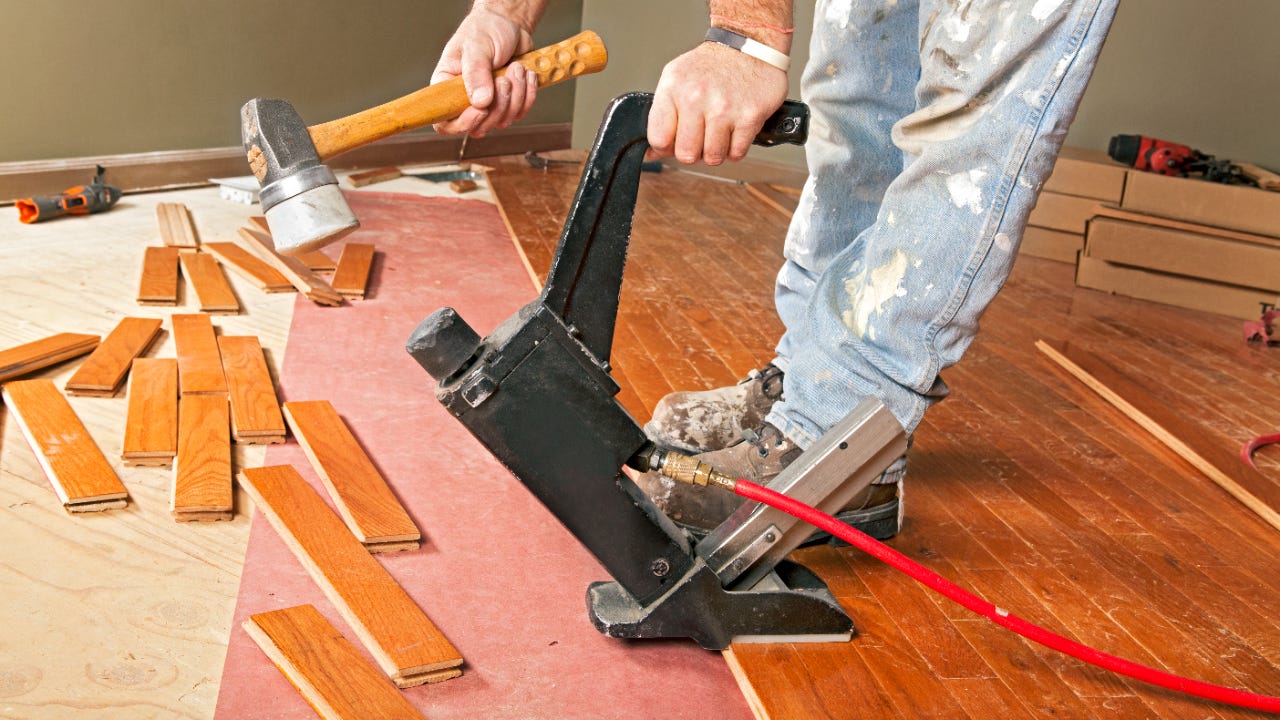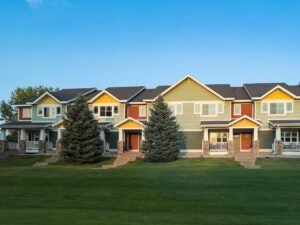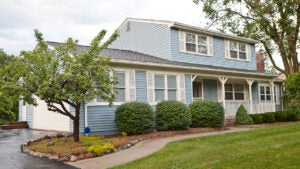How much hardwood flooring costs & how to save

Key takeaways
- Hardwood floors can potentially have a positive return on investment (ROI), unlike some other home improvement projects.
- Moving furniture, demolishing the current floor and preparing the subfloor should also be included in your budget.
- You can do some work yourself to save money, but working with a professional can prevent costly mistakes.
Hardwood flooring provides one of the best returns on investment. The National Realtor Association’s 2022 Remodeling Impact Report stated that homeowners who install new wood flooring before selling their homes recouped 118 percent of the cost at resale — and refinishing old hardwood has a recovered cost of 147 percent. That means hardwood floors essentially pay for themselves if you plan on eventually selling your home.
But before deciding to take on this home improvement project, consider the cost of installation and materials. Hardwood is expensive, especially if you opt for a rarer wood. There are some steps you can take to save money along the way, but budgeting will be crucial if you want a good ROI.
How much does hardwood floor installation cost?
The average cost to install hardwood flooring is between $6 and $25 per square foot, according to Angi. The cost may be higher — up to $45 per square foot — depending on the material, design and labor involved in installation.
Cost by material
Along with your preferences, your home plays a role in the types of wood that can or can’t be used. For instance, thinner pieces of wood might warp in areas of your home prone to more moisture. Type of wood, appearance and quality will all contribute to the cost of flooring.
- Type of wood: Stronger, more durable types of wood are more expensive. For instance, pine and acacia are less expensive, while walnut and teak are more expensive per square foot.
- Appearance: You’ll also need to consider the type of grain, texture and finish of the wood planks, as well as the length of the boards. The final appearance will depend on these factors.
- Thickness of the planks: Certain wood can only be cut to certain thicknesses. The thicker the wood, the more expensive it will be.
- Quality of materials: Will Lau, a real estate agent based in Southern California, suggests not going cheap on flooring with the intention of renovating it again later. “Instead, see installing wood floors as an investment that can be enjoyed by you and your family.”
Wood prices vary, depending on the grade (quality) and thickness of the lot. Expect to pay anywhere from $4 to $15 on materials alone — not including labor.
| Wood type | Average price per square foot | Characteristics | Installation Level |
|---|---|---|---|
| Maple | $4-$15 | Known for longevity and affordability, making it a popular choice | Moderate |
| Red oak | $5-11 | Known for signature grain patterns; best for high-traffic areas | Easy |
| White oak | $5-12 | Flexible and water-resistant, making it suitable for both indoors and outdoors | Easy |
| Hickory | $6-14 | Known for strength and resilience; ideal for areas prone to wear and tear | Challenging |
| White ash | $6-$14 | Known for flexibility, toughness and shock resistance | Easy |
| Brazilian walnut | $9-$15 | Tough, dense, exotic and expensive, but long-lasting | Extremely challenging |
| Sources: Angi, Thumbtack |
Cost by size
The size of the area you want to add hardwood to will also have a big impact on the cost. A smaller room may cost as little as $600. A bigger project, like putting hardwood floors in a 4,000-square-foot home, can quickly reach a six-figure price tag.
| Square footage | Average cost |
|---|---|
| 150 | $1,100-$3,800 |
| 250 | $1,800-$6,300 |
| 500 | $3,400-$13,000 |
| 1,000 | $6,000-$24,000 |
| 1,200 | $8,500-$31,500 |
| 1,500 | $10,000-$36,400 |
| 2,000 | $12,000-$48,000 |
Other cost factors
Labor is another major factor in the cost of laying hardwood flooring, but it’s not the only one.
- Moving furniture: If you’re only refinishing a single room, you may be able to move the furniture yourself. But for a full remodel, you may need to hire professional movers and rent storage space for your furniture.
- Demolishing the existing floor: Labor costs typically include removing the old flooring, but you may be able to do this prep work yourself to save money. If you choose to hire a professional for carpet removal, expect to add another $150-$250 to your total cost.
- Preparing the subfloor: You won’t know this cost for sure until you pull out the original flooring — the amount of work depends on the size of your home and the condition of your flooring. If your flooring is in less-than-stellar shape, expect a higher cost.
- Labor: Flooring installation generally costs $3 to $6 per square foot, according to Angi — unless complications arise.
- Floor pattern: According to Rachel Zepernick, interior home expert at Angi, “The style you choose is another important factor in the cost of your hardwood flooring, with wide plank on one end, ranging from $2 to $12 per square foot, and genuine parquet on the other end, costing between $20 and $45 per square foot.”
- Trends and availability: The most common flooring options will be more affordable and much easier to source. On the other hand, a particularly trendy species or style — like wide planks, chevron patterns or hand-scraped engineered hardwoods — often have inflated prices, due to demand.
How to save on hardwood flooring costs
To save on costs, be prepared to do some thorough research and at least some of the work yourself.
1. Refinish your existing wood floors
This is one of the most cost-effective options, Lau says. However, it’s only an option if you have solid wood floors or certain types of engineered wood. You can’t refinish laminate, so you may be stuck ripping it out and replacing it with hardwood.
But refinishing does have the highest ROI, according to the Remodeling Impact Report. So if your house already has hardwood and you just want to change the stain, refinishing is the most cost-effective option.
2. Research materials
Since the type of wood you use plays a large role in the cost, research the typical prices for different species, grains, lengths and thicknesses of wood flooring. Tropical hardwoods will cost more on average, but each type of wood has a wide range of costs, depending on quality.
In addition, be sure to buy in excess. The lot matters when you need to do touch-ups, so having extra will help avoid mismatched flooring in the future.
3. Decide on engineered versus solid wood
Wood flooring comes in two main types: solid and engineered. Solid wood is a single layer of wood, while engineered wood is made of several layers of plywood and hardwood.
Engineered wood is more durable and can be more expensive to buy, but it’s less expensive to install and less prone to warping. Solid wood can be less expensive to purchase, but it’s pricier to install.
4. Remove your own furniture
Anything you can do to make it easy for workers will save on costs. Moving and covering your furniture means there’s less for the installers to handle.
You can also compare the cost of having your contractor’s team move your furniture versus hiring movers. If you plan on redoing the flooring in your whole house and tackling other projects at the same time, it may be worth hiring professional movers and renting a storage space until renovations are done.
5. Demo your old floor yourself
If you have the time, equipment and know-how, demolish your existing flooring before the project begins, Lau says. Removing the old flooring yourself can help you save on labor costs. But be careful during the demolition — you don’t want to mess up the subfloor and cause yourself an additional financial headache.
6. Do it yourself
You should only do all or part of the job if you have the experience to install hardwood floors. Otherwise, it might be more costly and time-intensive to attempt DIY hardwood flooring installation, only to have to hire someone to fix your mistakes later.
How to finance the cost of hardwood flooring
To cover the costs of hardwood flooring, consider taking out a home improvement loan, a home equity loan or a home equity line of credit.
Home improvement loans
Home improvement loans are a type of personal loan meant specifically for projects like hardwood floor installation. They offer fixed rates and are good for covering set costs. They’re especially useful if you want to avoid using your home as collateral. If you’ve already gotten quotes and know how much your project will cost, a home improvement loan may be the right option.
Keep in mind that lenders offering unsecured personal loans rely on your credit profile to determine your eligibility and the rates you’re offered. You’ll need to shop around to get the best personal loan rates. Comparing lenders is especially important when looking at bad credit loan rates, which tend to run much higher — sometimes up to 36 percent.
After prequalifying with at least three lenders, use a personal loan calculator to find out how much your monthly payment will be.
Home equity loans
A home equity loan is similar to a home improvement loan. You receive a lump sum and pay back the loan over a set term, usually five to 20 years, although some loans may have terms of up to 30 years.
However, your home serves as collateral for the loan. This means you can access lower rates, but if you’re unable to repay the loan, you risk losing your home to foreclosure.
Home equity lines of credit
A home equity line of credit (HELOC) also uses your home as collateral, but unlike a home equity loan, it functions similarly to a credit card.
Rather than receiving a lump sum, you’ll have access to funds as you need them and can repay and reborrow as much as you need. The draw period is usually up to 10 years, and they are good for covering unexpected expenses that crop up during big projects like installing hardwood floors.
Bottom line
Doing your homework can give you a good idea of how much time and money it will take to purchase the materials and install hardwood flooring. Prepare for the project by having your plumbing inspected, hiring a consultant and creating a savings plan. If you need to spread out the cost of your new flooring, have your budget and financing figured out well in advance.
Why we ask for feedback Your feedback helps us improve our content and services. It takes less than a minute to complete.
Your responses are anonymous and will only be used for improving our website.
You may also like

How to save money on pet insurance





